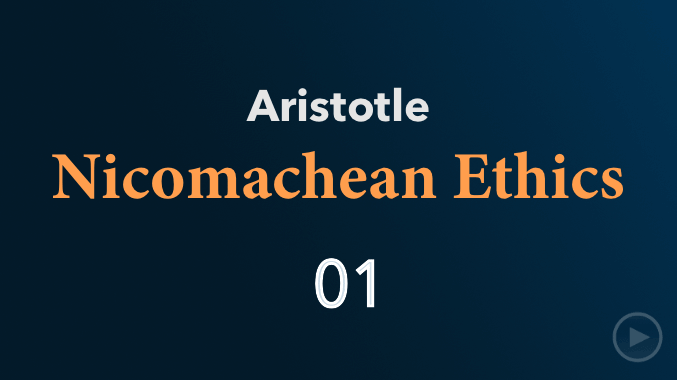• Nicomachean Ethics 01 •
• Aristotle •

About “Nicomachean Ethics" 01 by Aristotle
Τhe first book of Aristotle's Nicomachean Ethics (Gr.: Ἠθικὰ Νικομάχεια) progressively builds an argument about the following: That the good is the universal goal of all; that political science seeks the highest good. That goods and topics in political science provide many controversies. The aims of political science and what is the highest good. The modes of human existence (the hedonistic, the political, the contemplative); the idea of the good. That happiness is the ultimate good. The types of goods and their evaluation. That happiness consists in action and activity; that happiness is acquired through learning or habituation and through practice, and it is not a result of chance.The question "who is truly happy" and the saying by Solon about happiness. That happiness, being a noble and perfect good, is worthy of being considered a blessing rather than a subject for praise. That virtue is the foundation of happiness. A division of virtues into the rational and irrational parts of the soul, thus into intellectual and moral virtues.
You can follow the Greek text of “Nicomachean Ethics” book 1 by Aristotle, online at Archive.org.
Many editions with translation in English can be found at Archive Books
about Aristotle
Aristotle (Gr.: Ἀριστοτέλης), one of the most important philosophers of Antiquity, was born in 385 BCE in Stageira of Chalkidike. Born in a rich family he had the opportunity to get high education. From 367 BCE on and for about twenty years, he studied philosophy in Athens by Plato and also taught in his Academy. After the death of Plato he moved to the city of Assus in Asia Minor, where he taught philosophy until 345 BCE., when he accepted an invitation by Theophrastus to teach in Mytilene. In 342 BCE King Philippus asked him to teach his 13 years old son, Alexander. After the death of Philippus Aristotle returned to Athens and established the “Lyceum”, where he set his teaching forth. However, after the death of Alexander in 323 BCE and having been accused by opponents for disrespect, he retired in Chalkis. He died in 322 BC from some stomach disease.
Aristotle left a lot of works. The works that have survived are distinguished in logical, physical, biological, psychological, metaphysical, moral, political, technological and various problems.
The Aristotelian works have included the following, which are not considered genuine: Physiognomy, About Miraculous Things Heard, About Colors, Mechanics, Rhetoric to Alexander and On Hearing.
About the audio~videobook
 The recording contains the complete, unabridged Ancient Greek text of the Aristotelian “Nicomachean Ethics book 1”. The videobook shows the highlighted Greek text simultaneously with the reading.
After purchase you will be able to download the relevant file(s), containing the work in mp3 a/o mp4 format.
The recording contains the complete, unabridged Ancient Greek text of the Aristotelian “Nicomachean Ethics book 1”. The videobook shows the highlighted Greek text simultaneously with the reading.
After purchase you will be able to download the relevant file(s), containing the work in mp3 a/o mp4 format.
The videobook comes with (optional) captions in English. Other languages on request.
You can listen to the first chapter (1.1) of “Nicomachean Ethics, book 01”, an audio sample of the present audiobook. Please, click on the play-button bellow and, if you wish, follow the Ancient Greek text lower on the page, or alternatively watch the video, which is provided with a quick translation in English. Thank you!
ΗΘΙΚΑ ΝΙΚΟΜΑΧΕΙΑ 01.01
Πᾶσα τέχνη καὶ πᾶσα μέθοδος, ὁμοίως δὲ πρᾶξίς τε καὶ προαίρεσις, ἀγαθοῦ τινὸς ἐφίεσθαι δοκεῖ· διὸ καλῶς ἀπεφήναντο τἀγαθόν, οὗ πάντ’ ἐφίεται. διαφορὰ δέ τις φαίνεται τῶν τελῶν· τὰ μὲν γάρ εἰσιν ἐνέργειαι, τὰ δὲ παρ’ αὐτὰς ἔργα τινά. ὧν δ’ εἰσὶ τέλη τινὰ παρὰ τὰς πράξεις, ἐν τούτοις βελτίω πέφυκε τῶν ἐνεργειῶν τὰ ἔργα. πολλῶν δὲ πράξεων οὐσῶν καὶ τεχνῶν καὶ ἐπιστημῶν πολλὰ γίνεται καὶ τὰ τέλη· ἰατρικῆς μὲν γὰρ ὑγίεια, ναυπηγικῆς δὲ πλοῖον, στρατηγικῆς δὲ νίκη, οἰκονομικῆς δὲ πλοῦτος. ὅσαι δ’ εἰσὶ τῶν τοιούτων ὑπὸ μίαν τινὰ δύναμιν, καθάπερ ὑπὸ τὴν ἱππικὴν χαλινοποιικὴ καὶ ὅσαι ἄλλαι τῶν ἱππικῶν ὀργάνων εἰσίν, αὕτη δὲ καὶ πᾶσα πολεμικὴ πρᾶξις ὑπὸ τὴν στρατηγικήν, κατὰ τὸν αὐτὸν δὴ τρόπον ἄλλαι ὑφ’ ἑτέρας· ἐν ἁπάσαις δὲ τὰ τῶν ἀρχιτεκτονικῶν τέλη πάντων ἐστὶν αἱρετώτερα τῶν ὑπ’ αὐτά· τούτων γὰρ χάριν κἀκεῖνα διώκεται. διαφέρει δ’ οὐδὲν τὰς ἐνεργείας αὐτὰς εἶναι τὰ τέλη τῶν πράξεων ἢ παρὰ ταύτας ἄλλο τι, καθάπερ ἐπὶ τῶν λεχθεισῶν ἐπιστημῶν.
